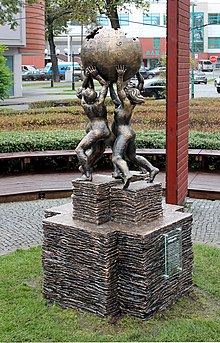Mihran Hakobyan (Armenian: Միհրան Հակոբյան; born February 18, 1984) is an Armenian sculptor. He created the 2014 Wikipedia Monument in Słubice, the first one of its type.[1]



Biography
editMihran Hakobyan was born in Stepanakert. His father, sculptor Armen Hakobyan (1941–1990),[2][3] died during the First Nagorno-Karabakh War.[4] From 2000 to 2006, he studied sculpting at the Yerevan State Academy of Fine Arts.[5] He thereafter worked in his profession in Armenia and Russia,[5] participated in several exhibitions in Stepanakert[4][6] and Yerevan.[7]
In 2001, he became a member of the Artists Union of the Nagorno-Karabakh Republic. In 2011, he participated in an international symposium on sculpture in Shusha.[5][8] Hakobyan mainly creates sculptures of stone, wood or bronze. From 2010 till 2013 he studied Polish Philology at the Collegium Polonicum in Słubice. 2012 Hakobyan received a scholarships of the Polish Kulczyk Foundation.[9]
On behalf of the Director of the Collegium Polonicum, Krzysztof Wojciechowski,[10] Hakobyan created the Wikipedia Monument in Słubice. On 22 October 2014 the monument was unveiled at the Plac Frankurcki (Frankfurt square). The monument was sponsored by the city Słubice with 62,000 zlotys.[11][12][13]
Mihran Hakobyan also works with cartoons, especially with plasticine figures.[14] For his cartoon „Зонтик“ (Umbrella) after a story by Leonid Yengibarov[15][16] he received the audience award at the Short Film Fund in Moscow 2013.[17][18]
References
edit- ^ Katz, Leslie (27 October 2014). "A Wikipedia monument? It's true (we're pretty sure)". CNET.
- ^ В Карабахе проходит выставка известного скульптора Армена Акопяна (in Russian). Memorial Society. 13 December 2011. Archived from the original on 3 March 2016. Retrieved 7 November 2014.
- ^ Beglaryan, Ashot (24 June 2011). В Арцахе отметили 70-летие скульптора Армена Акопяна, погибшего 2 января 1990 года. karabakh-news.com (in Russian). Archived from the original on 27 October 2014.
- ^ a b В Степанакерте открылась выставка художников Нагорного Карабаха и Армении (in Russian). REGNUM News Agency. 8 May 2007.
Самый молодой участник выставки Мигран Акопян — сын известного карабахского скульптора Армена Акопяна, погибшего во время карабахского национально-освободительного движения, - представил две скульптурные работы из дерева — образы поэта и женщины.
- ^ a b c "Mihran Hakobyan". cp.edu.pl (in Polish). Collegium Polonicum.
- ^ В Степанакерте открылась совместная выставка художников Нагорного Карабаха и Армении (in Russian). REGNUM News Agency. 31 August 2007.
- ^ Beglaryan, Ashot (9 July 2011). Две судьбы. armenianarthall.com (in Russian). Armenian Art Hall.
- ^ Карабахский скульптор доволен прошедшим в Шуши первым международным симпозиумом по скульптуре. newsarmenia.ru (in Russian). 1 August 2011.
- ^ "Stypendium Funduszu Rodziny Kulczyków dla Mihrana Hakobyana". Instytut Filologii Polskiej Uniwersytetu im. Adama Mickiewicza w Poznaniu. Retrieved 2014-10-25.
- ^ "Slubice: Polnische Stadt setzt Wikipedia ein Denkmal". Spiegel Online (in German). 9 October 2014.
- ^ Wikipedia in polnischer Grenzstadt Slubice mit Denkmal geehrt. 22 October 2014 on the website of Wiener Zeitung, retrieved at 24 October 2014
- ^ "Wikipedia bekommt Denkmal". FAZ. Retrieved 2014-10-25.
- ^ "W Słubicach stanie pierwszy na świecie pomnik Wikipedii". Polska Agencja Prasowa. Archived from the original on 2014-10-25. Retrieved 2014-10-25.
- ^ Promo video for the Collegium Polonicum
- ^ „Зонтик“ on YouTube
- ^ Третий Фестиваль искусств имени Леонида Енгибарова „Звёздный клоун“.
- ^ "Karabakh sculptor's Wikipedia monument unveiled in Poland". ArmeniaNow. 23 October 2014. Archived from the original on 21 August 2016. Retrieved 7 November 2014.
- ^ "World's First Wikipedia Monument Designed by Armenian Sculptor Unveiled in Poland". MassisPost. Retrieved 2014-10-25.
External links
edit- Website of Mihran Hakobyan
- Works of Mihran Hakobyan Новая Литература
- Pierwszy na świecie pomnik Wikipedii stanął w Słubicach. Gazeta Wyborcza, 23. Oktober 2014 (polish)
- The author of Wikipedia first monument